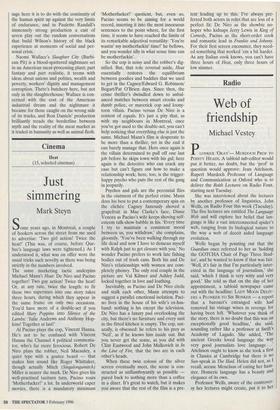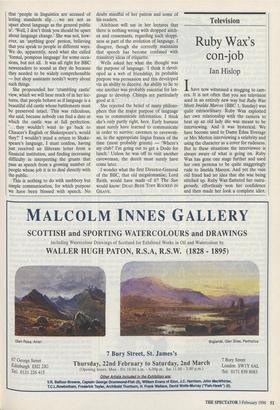Radio
Web of friendship
Michael Vestey
PLONKER `OKAY'— MURDOCH PROF TO POINTY HEADS. A tabloid sub-editor would put it better, no doubt, but the 'prof in question would approve: Jean Aitchison, Rupert Murdoch Professor of Language and Communication at Oxford who is to deliver the Reith Lectures on Radio Four, starting next Tuesday.
She was interviewed about the lectures by another professor of linguistics, John Wells, on Radio Four this week (Tuesday). The five lectures are entitled The Language Web and will explore her belief that lan- guage is like a vast interconnected spider's web, ranging from its biological nature to the way a web of deceit aided language evolution.
Wells began by pointing out that the Guardian once referred to her as 'holding the GOTCHA Chair of Page Three Stud- ies', and he wanted to know if that was fair. `Well, it's fair in that I'm particularly inter- ested in the language of journalism,' she said, 'which I think is very witty and very good.' She told us that on the day of her appointment, a tabloid newspaper came out with the headline: LADY MOON DELIV- ERS A PLONKER TO SIR BONKER — a report that a baronet's estranged wife had removed his vintage wines in revenge for having been left. 'Whatever you think of the story, there is no doubt that this was an exceptionally good headline,' she said, sounding rather like a professor at Swift's Academy of Lagado. She added, 'The ancient Greeks loved language the way very good journalists love language ... Aitchison ought to know as she took a first in Classics at Cambridge but there is no Sun-speak in The Iliad. Helen did not, as recall, accuse Menelaus of eating her ham- ster. Homeric language has a beauty and elegance of its own.
Professor Wells, aware of the controver- sy her lectures might create, put it to her that 'people in linguistics are accused of letting standards slip ... we are not as upset about language as the general public is'. 'Well, I don't think you should be upset about language change.' She was not, how- ever, an 'anything goes' person, believing that you speak to people in different ways. We do, apparently, need what she called `formal, pompous language' for some occa- sions, but not all. It was all right for BBC newsreaders to sound as they do because they needed to be widely comprehensible — but shop assistants needn't worry about such things.
She propounded her 'crumbling castle' view, which we will hear much of in her lec- tures, that people behave as if language is a beautiful old castle whose battlements must be preserved intact. This was ridiculous, she said, because nobody can find a date at which the castle was at full perfection. `. .. they wouldn't want to go back to Chaucer's English or Shakespeare's, would they?' I wouldn't mind a return to Shake- speare's language, I must confess, having just received an illiterate letter from a financial institution, and finding increasing difficulty in interpreting the grunts that pass as speech from a growing number of people whose job it is to deal directly with the public.
This is nothing to do with snobbery but simple communication, for which purpose we have been blessed with speech. No doubt mindful of her patron and some of his readers, Aitchison will say in her lectures that there is nothing wrong with dropped aitch- es and consonants, regarding such sloppi- ness as part of the evolution of language. I disagree, though she correctly maintains that speech has become confused with transitory ideas of etiquette.
Wells asked her what she thought was the purpose of language. 'I think it devel- oped as a web of friendship, its probable purpose was persuasion and this developed via an ability to deceive. An ability to lie to one another was probably essential for lan- guage to develop. Chimps are particularly good at it.'
She rejected the belief of many philoso- phers that the major purpose of language was to communicate information. I think she's only partly right, here. Early humans must surely have learned to communicate in order to survive: cavemen to cavewom- an, in the appropriate lingua franca of the time (most probably grunts) — 'Where's my club? I'm going out to get a Dodo for lunch.' Unless he was off to visit another cavewoman, the deceit must surely have come later.
I wonder what the first Director-General of the BBC, that old megalomaniac, Lord Reith, would have made of it? The Sun would know: DEAD BEER TOFF ROCKED IN GRAVE.



































































 Previous page
Previous page